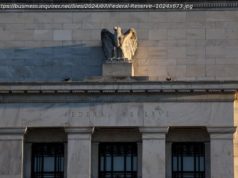Stocks are mixed in midday trading on Wall Street Friday as the market erases much of an early loss.
New York – Stocks are mixed in midday trading on Wall Street Friday as the market erases much of an early loss. Indexes had plunged the day before as worries about an escalating trade conflict between the U. S. and China rattled investors.
The Chinese government said it might place tariffs on a $3 billion list of U. S. goods in response to the steel and aluminum tariffs President Donald Trump announced earlier this month. Those goods include pork, apples, and steel pipes.
China didn’t respond yet to the tariffs Trump announced on Thursday, which could affect as much as $60 billion in imports. The White House says Beijing steals or forces foreign companies to hand over technology, and China has said it will defend itself.
Losses for chipmakers pulled technology companies lower and banks also fell. Markets dropped in Europe and Asia.
After wavering up and down for much of the day, the S&P 500 index was up 3 points, or 0.1 percent, to 2,647 as of 2 p.m. Eastern time. It had dropped 2.5 percent Thursday. The Dow Jones industrial average added 128 points, or 0.5 percent, to 24,085. The Nasdaq composite fell 8 points, or 0.1 percent, to 7,160.
The Dow dropped more than 700 points Thursday, its worst loss since early February, as investors worried the dispute could escalate and could slow down global economic growth and company profits.
Germany’s DAX lost 1.8 percent and the French CAC-40 fell 1.4 percent. The FTSE 100 in Britain dipped 0.4 percent.
In Asia, markets ended sharply lower after a stomach-churning ride. Japan’s benchmark Nikkei 225 index plunged 4.5 percent and South Korea’s Kospi tumbled 3.2 percent. Hong Kong’s Hang Seng lost 2.5 percent.
Big U. S. companies tend to get more of their revenue from foreign customers than small companies do, and that makes them more vulnerable to damage from a trade war. With nearly 1.4 billion people, China is a big market for the largest U. S. businesses.
That’s especially true for technology companies. Apple got 63 percent of its revenue from outside the U. S. in its last fiscal year, for example, and roughly $1 of every $5 in Apple’s sales came from China, Hong Kong and Taiwan. That doesn’t even take into account how much of the manufacturing and assembly of Apple products is done in Chinese factories, which could be affected if tariffs start piling up.
Chipmakers fared especially badly Friday. Micron Technology shed $3.86, or 6.6 percent, to $55.06 after its quarterly report. Nvidia lost $3.74, or 1.5 percent, to $238.11. Applied Materials declined $1.88, or 3.2 percent, to $57.08. Hard drive maker Western Digital, which only gets about 20 percent its revenue from the U. S., lost $6.41, or 6.4 percent, to $94.42.
U. S. bond prices held steady after soaring a day earlier. The yield on the 10-year Treasury note held steady at 2.83 percent.
Bond yields climbed earlier this week after the Federal Reserve raised interest rates, but then tumbled after the tariffs were proposed. Lisa Erickson, chief investment officer at U. S. Bank Wealth Management, said investors are concerned the rising trade tensions will slow down economic growth. If that happens, interest rates will likely rise at a slower pace.
“If we do enter more of a protracted trade war, that is likely to impact growth, so that’s likely to slow down interest rates,” she said.
In another sign investors are nervous, gold and silver prices jumped. Gold climbed $22.50, or 1.7 percent, to $1,349.90 an ounce and silver gained 20 cents, or 1.2 percent, to $16.58 an ounce. The dollar fell to 104.96 yen from 105.61 yen. The euro rose to $1.2365 from $1.2307.
The Russell 2000 index of smaller-company stocks dipped 6 points, or 0.4 percent, to 1,537 Friday, but it’s actually up almost 1.6 percent this month while the S&P 500 is down 3 percent.
Smaller companies have held up better than larger ones during the recent tumult over tariffs, in part because they do more of their business inside the U. S. and have less to fear from international trade disputes. While the tariffs might drive up their costs, they can pass those along to consumers by raising prices. Retaliatory tariffs on U. S. exports won’t affect them as much.
Not every company breaks out exactly how much of its revenue comes from abroad versus domestically. But FactSet estimates that 30.5 percent of revenue for big companies in the S&P 500 comes from outside the United States, versus just 19.5 percent for the smaller companies in the S&P 600 index.
Add on top of that the bigger benefit that small companies are getting from lower U. S. tax rates, and the outperformance is unsurprising, analysts say.
“We think a lot of the areas in the market with the greatest potential for earnings improvement this year are small- and mid-cap stocks, things that have the biggest benefit from tax reform and are less subject to trade wars,” said Eric Marshall, portfolio manager at Hodges mutual funds.
The price of oil climbed $1.20, or 1.9 percent, to $65.60 a barrel in New York. Brent crude, the international standard for oil prices, added 88 cents, or 1.3 percent, to $69.26 a barrel in London.
Copper fell 3 cents to $2.99 a pound.
––––
Stan Choe contributed from New York. Kelvin Chan contributed from Hong Kong and Pan Pylas contributed from London.






